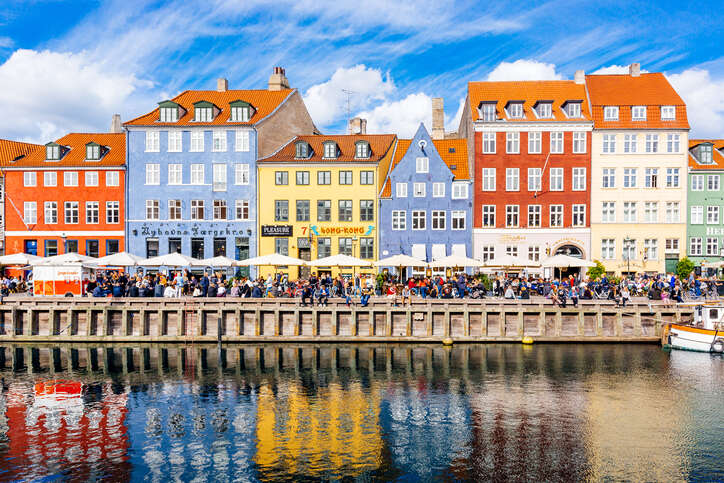
- At least 240 cities globally have set net-zero or carbon-neutral targets for 2050 or sooner, according to research led by Oxford University.
- With their mayors leading the fight against climate change, 60 cities have net-zero ambitions that exceed those of their respective nations.
- Melbourne’s mayor, for example, wants the city to attain zero-emissions status by 2040 – ten years ahead of Australia as a whole.
Most countries have now set net-zero or emissions reductions targets. As of November 2021, more than 80% of global GDP and 77% of global greenhouse gases are covered by some form of national net-zero target, according to analysis – dubbed Net Zero Tracker – by Oxford University in collaboration with the non-profit Energy and Climate Intelligence Unit, data analytics firm Data-Driven EnviroLab, think tank the NewClimate Institute, and research initiative Oxford Net Zero.
These countries are joined by hundreds of cities committing to reducing emissions in line with a 1.5°C temperature rise scenario. Many of these commitments are made through initiatives such as Cities Race to Zero, which is part of the UN Race to Zero campaign that galvanises support from businesses, regions, investors and cities for a net zero by 2050 future.
So far, more than 1,000 cities have joined the Cities Race to Zero initiative, and, either through this campaign or separately, 240 cities have set formal net-zero targets according to the Net Zero Tracker, which crunches data on cities with populations of more than half a million people. While cities cover just 3% of the earth’s land surface, they account for more than 70% of global CO2 emissions, according to the World Economic Forum.
Of the 240 cities, 60 have set net-zero or carbon-neutral – whereby for most, carbon offsets will feature prominently in order to achieve an emissions goal – ambitions that exceed those of their nations. The 60 cities include those that have stated these ambitions in policy documents, although not all are backed up by a proper plan or an announced formal target.
Focusing just on those with formal targets that are backed up by plans, only 30 cities have targets that exceed those of their nations in terms of deadline ambition. According to data from CDP, a non-profit organisation that helps companies and cities disclose their environmental impact, the cumulative emissions of 18 of the 30 cities, which are located mainly in the US and Europe, amount to 31.2 million tonnes of CO2 – roughly equivalent to the 2020 emissions of Ireland.
Copenhagen has one for the most aggressive targets, exceeding Denmark’s national 2050 target by 25 years. The city has trialled innovative ways of producing energy, such as through its EnergyLab Nordhavn, a ‘smart energy’ grid that integrates the city’s heat, electricity and light through a flexible system situated by the harbour.
Mayors leading the way on climate change
Other cities with notably advanced net-zero goals include Nottingham, which has set a carbon-neutral by 2028 target, placing it ahead of most European cities and all other UK cities in terms of ambition.
That city leaders are focused on climate change is certainly evident in Australia, which has an addiction to coal that has earned it the reputation of being a climate laggard, despite the country having a 2050 target. In 2021, the Lord Mayor of Melbourne announced the city’s plans to reach zero emissions – releasing no greenhouse gases into the atmosphere – by 2040, while Sydney plans to become carbon-neutral by 2035.
These ambitions contrast starkly with that of the attitude of the former Australian prime minister Scott Morrison, who in November 2019 urged politicians to "end the bickering" over the link between climate change and natural disasters while wildfires raged through the country. In response, 12 Australian mayors signed a statement demanding that the federal government do acknowledge the link. The country's current government was brought in on a green ticket this year.
Population is a net-zero factor
While more developed countries are among the most likely to have the most ambitious targets, Capital Monitor also finds that population size could be another significant factor for setting deadlines.
Copenhagen and Adelaide, for example, both have the most ambitious targets, and the smallest population sizes, of the cities (see chart above). Similarly, Mumbai, with the largest population of 20 million, has one of the latest net-zero targets (2050).
Ambition is relative, however, and compared with India’s 2070 net-zero target, Mumbai is well ahead of the curve. As the first South Asian city to produce a net-zero roadmap in March last year, it is reported to be considering raising funds through green bonds announced by the federal government to reach its goal, alongside making large investments in housing, electrifying public transport, and investing in solar power.
Actions beyond climate change targets
While setting an emissions reductions target should be the first step in planning for net zero, there are other measures cities can take in a bid to reduce their environmental footprint.
In 2021, 68 new ‘high-impact actions’ were implemented by C40 Cities – a global network of city mayors who wish tackle climate change. These actions include introducing policies such as investing in emissions-free buildings, or restricting single-use and non-recyclable materials.
In South Africa, for example, Johannesburg and Durban introduced policies towards net-zero carbon new buildings in 2021, while three more cities, including Kuala Lumpur in Malaysia, started to require renewables to be used in all buildings.
Just ahead of Cop26, C40 Cities chairman and mayor of Los Angeles, Eric Garcetti, argued: “Mayors worldwide are on the front lines of the climate change crisis – and we stand front and centre in the fight to address it.” In the same month, mayors from over 100 US cities officially joined the Cities Race to Zero.
As cities are responsible for a large chunk of most country’s emissions, it’s clear that their mayors have a vital role to play in advancing a nation's net-zero target. As such, more cities should look to outpace their countries in the race to net zero.
Capital Monitor is hosting the Webinar series, Making Sense of Net Zero. Find out more information on NSMG.live.




